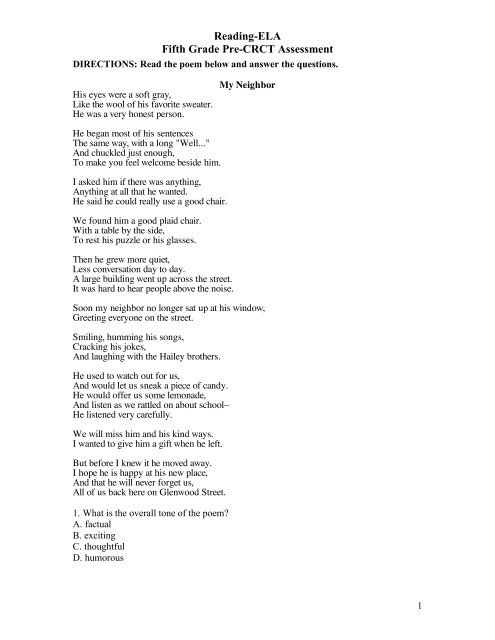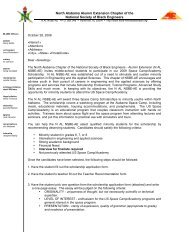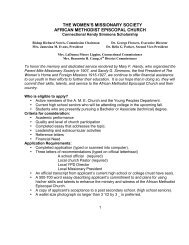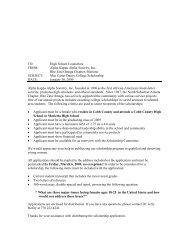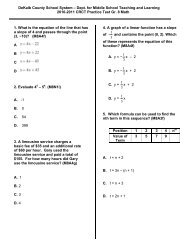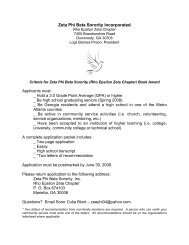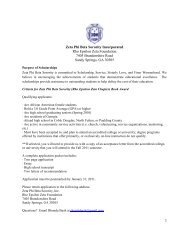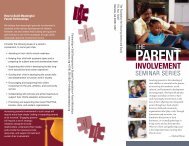5th Grade CRCT Assessment 2 - Ensuring Access and Equity
5th Grade CRCT Assessment 2 - Ensuring Access and Equity
5th Grade CRCT Assessment 2 - Ensuring Access and Equity
You also want an ePaper? Increase the reach of your titles
YUMPU automatically turns print PDFs into web optimized ePapers that Google loves.
Reading-ELA<br />
Fifth <strong>Grade</strong> Pre-<strong>CRCT</strong> <strong>Assessment</strong><br />
DIRECTIONS: Read the poem below <strong>and</strong> answer the questions.<br />
His eyes were a soft gray,<br />
Like the wool of his favorite sweater.<br />
He was a very honest person.<br />
My Neighbor<br />
He began most of his sentences<br />
The same way, with a long "Well..."<br />
And chuckled just enough,<br />
To make you feel welcome beside him.<br />
I asked him if there was anything,<br />
Anything at all that he wanted.<br />
He said he could really use a good chair.<br />
We found him a good plaid chair.<br />
With a table by the side,<br />
To rest his puzzle or his glasses.<br />
Then he grew more quiet,<br />
Less conversation day to day.<br />
A large building went up across the street.<br />
It was hard to hear people above the noise.<br />
Soon my neighbor no longer sat up at his window,<br />
Greeting everyone on the street.<br />
Smiling, humming his songs,<br />
Cracking his jokes,<br />
And laughing with the Hailey brothers.<br />
He used to watch out for us,<br />
And would let us sneak a piece of c<strong>and</strong>y.<br />
He would offer us some lemonade,<br />
And listen as we rattled on about school–<br />
He listened very carefully.<br />
We will miss him <strong>and</strong> his kind ways.<br />
I wanted to give him a gift when he left.<br />
But before I knew it he moved away.<br />
I hope he is happy at his new place,<br />
And that he will never forget us,<br />
All of us back here on Glenwood Street.<br />
1. What is the overall tone of the poem<br />
A. factual<br />
B. exciting<br />
C. thoughtful<br />
D. humorous<br />
1
Reading-ELA<br />
Fifth <strong>Grade</strong> Pre-<strong>CRCT</strong> <strong>Assessment</strong><br />
2. Which sentence has the same meaning as "It was hard to hear people above the noise"<br />
A. It was difficult hearing the people on the upper floors of the building.<br />
B. The people in the upper floors of the building made a lot of noise.<br />
C. People's voices were louder than the noise of the building going up.<br />
D. The noise of the building going up made it hard to hear people talking.<br />
3. Based on the poem's images, which activity did the neighbor enjoy MOST when he<br />
lived on Glenwood Street<br />
A. talking to people in the neighborhood<br />
B. watching people on the street<br />
C. working on puzzles<br />
D. singing songs<br />
DIRECTIONS: Read the passage below <strong>and</strong> answer the questions.<br />
Journey to Freedom<br />
by Jim Shively<br />
While Jeb tried to sleep on his straw mattress on the dirt floor of his home in<br />
Louisiana, he heard Ma, Pa, Aunt Beulah, <strong>and</strong> Uncle Noah talking about a better life.<br />
Uncle Noah was a plantation clerk <strong>and</strong> could read most of the words on the flyer he had<br />
seen posted in town. The poster promised free l<strong>and</strong>, mules, a plow, <strong>and</strong> money to those<br />
who could get to Kansas. Uncle Noah convinced the family to move.<br />
The steamboat ride up the Mississippi River to St. Louis, Missouri, was exciting.<br />
In St. Louis, they boarded a steamboat that carried them up the Missouri River. But as<br />
they continued westward across Missouri, the family heard rumors that the Kansas<br />
promises were untrue. Pa began to worry.<br />
The weather turned wet <strong>and</strong> cold. Uncle Noah <strong>and</strong> Jeb got sick. At Wy<strong>and</strong>otte,<br />
Kansas, Jeb heard officials say they could not l<strong>and</strong> there with a boatload of sick people.<br />
By the time they got to Leavenworth, twenty-one of one hundred thirty travelers were ill.<br />
Jeb slowly recovered, but Uncle Noah continued to cough <strong>and</strong> said his chest hurt.<br />
The ride to Ellis, Kansas, on the Kansas Pacific Railroad thrilled Jeb. But the last<br />
leg of their journey required long days of walking many miles across Kansas, <strong>and</strong> Uncle<br />
Noah needed to rest often.<br />
One night, they camped along a creek. Jeb woke up coughing <strong>and</strong> listened for<br />
Uncle Noah's hoarse breathing. Instead, he heard Aunt Belulah sobbing. Uncle Noah had<br />
died. Jeb helped his father dig Uncle Noah's shallow grave. They had barely finished<br />
covering it with rocks when it began to rain. It would be better to turn back than to<br />
continue on this miserable journey, Jeb thought.<br />
In the morning, the family continued to travel north. Along the way, Jeb spotted a<br />
cow stuck in a thicket. He pulled her out. When he gently tugged on the worn rope<br />
hanging around her neck, she willingly followed him.<br />
Pa finally claimed l<strong>and</strong> along a quiet stream. He <strong>and</strong> Jeb built a lean-to of willow<br />
branches so the family would have temporary shelter from the weather. Then they dug a<br />
hole into the side of a hill that was three feet deep, fourteen feet wide, <strong>and</strong> sixteen feet<br />
high. With Aunt Beulah <strong>and</strong> Ma, Jeb built walls <strong>and</strong> plastered the inside with mud. Jeb<br />
2
Reading-ELA<br />
Fifth <strong>Grade</strong> Pre-<strong>CRCT</strong> <strong>Assessment</strong><br />
cut into three-foot pieces the damp sod that his father had plowed to clear l<strong>and</strong> for crops.<br />
They piled sod over branches to roof their new house. Although the roof leaked <strong>and</strong><br />
snakes, rodents, <strong>and</strong> insects lived there with them, they finally had their first home in<br />
Kansas!<br />
In June, the corn <strong>and</strong> wheat they had managed to plant were knee-high. But then<br />
swarms of grasshoppers appeared. Jeb hoped the wind would blow them away, but when<br />
he went to the fields to hoe, he felt sick seeing hordes of the insects attacking the grain.<br />
All their hard work would be destroyed, Jeb thought. Fortunately, Pa managed to plant<br />
sorghum, which ripened in late fall.<br />
During their first winter in Kansas, the blizzard winds howled. Jeb wondered if<br />
the sod roof would hold the drifting snow. He worried about his cow <strong>and</strong> how she would<br />
stay warm in the lean-to that was her shelter. Outside, Jeb thought he would freeze while<br />
shoveling a path to feed her.<br />
By early April, the family's stored food was almost gone. Pa calmed Jeb's inner<br />
fear—he told him they would not butcher the cow. They burned buffalo chips for<br />
warmth, <strong>and</strong> the cow ate nearly all the livestock food. Jeb dug through the snow to get<br />
dried grass to twist for fuel <strong>and</strong> to feed his animal.<br />
With the first warm days of spring, Pa <strong>and</strong> Jeb hurried to cut up more sod to make<br />
room for new crops. They used some of the sod pieces to repair the house. Pa hoped the<br />
melting snow would be enough water for the crops. Jeb came home from school every<br />
day <strong>and</strong> worked on the farm with Pa. The seeds that they planted sprouted, but then<br />
weeks without rain caused the crops to wither <strong>and</strong> die. Replanting would work only if the<br />
rains came.<br />
One day, while looking out the school window, Jeb saw a prairie fire in the<br />
distance. The new teacher from the East did not know what to do, but Jeb did. He found a<br />
rake with a broken h<strong>and</strong>le <strong>and</strong> some croker sacks that were used to cover the windows in<br />
cold weather. Jeb raked parched grass to make a bare area on the windward side to slow<br />
the advance of the fire. He choked from smoke as the fire came closer. Job shouted to the<br />
other children to carry water <strong>and</strong> beat out the flames with wet sacks. Sparks singed his<br />
hair, but he kept working. Jeb almost cried with relief when he saw men <strong>and</strong> horses<br />
pulling plows <strong>and</strong> rakes to attack the fire. When Jeb looked up, he could see rain clouds<br />
beginning to form in the distance.<br />
4. The MAIN REASON the author included the paragraphs about the family's journey to<br />
Kansas was to show…<br />
A. the hardships of such a trip.<br />
B. how strong <strong>and</strong> brave Jeb was.<br />
C. that for them the trip was a great adventure.<br />
D. why Pa was worried about going to Kansas.<br />
5. Jeb thought it would be better to turn back than to continue on to Kansas when<br />
A. the weather turned wet <strong>and</strong> cold.<br />
B. Uncle Noah died on the last part of their journey.<br />
C. the family heard rumors that the Kansas promises were not true.<br />
D. many people on their boat got very sick.<br />
3
Reading-ELA<br />
Fifth <strong>Grade</strong> Pre-<strong>CRCT</strong> <strong>Assessment</strong><br />
6. What is sorghum<br />
A. a grain crop<br />
B. grasshopper food<br />
C. a special way of planting crops<br />
D. plants that grow only in the spring<br />
DIRECTIONS: Read the passage below <strong>and</strong> answer the questions.<br />
Sharks<br />
There is no other fish or animal that uses its senses quite like the shark does. The<br />
shark has a very keen sense of smell. It is able to smell odors from very far distances.<br />
This helps lead the shark to its prey. A large part of the shark's brain is used for the sense<br />
of smell.<br />
The shark has another important sense called "distant touch." This sense helps it<br />
to locate food. The shark is able to feel movement with its "lateral line." The lateral line<br />
is a thin long line of nerves down each side of the shark's body. This lateral line of nerves<br />
allows the shark to feel the vibrations of the moving prey. These vibrations lead the shark<br />
to its next meal.<br />
A shark also has good eyesight. Its eyes are able to see in dim light. It needs this<br />
good eyesight to hunt for food. Scientists have learned that a shark is able to see up close.<br />
This helps in catching smaller prey.<br />
A shark also has excellent hearing. The shark is able to hear low-pitched sounds<br />
that travel through the water.<br />
All these senses help the shark to survive in the oceans of the world.<br />
7. A shark's lateral line is<br />
A. its thrashing tail.<br />
B. its slotted gills.<br />
C. helpful for feeling vibrations.<br />
D. helpful for quick movement.<br />
8. In paragraph 1, sentence 2, the word keen means<br />
A. dull.<br />
B. sharp.<br />
C. loud.<br />
D. small.<br />
DIRECTIONS: Read the passage below <strong>and</strong> answer the questions.<br />
The First Americans<br />
During the most recent Ice Age, people who lived in many parts of the world<br />
knew only an endless, bitter winter. Ice Age people depended on animals for most of the<br />
things they needed to survive. They hunted animals for food. They dressed in fur<br />
clothing. And they lived in shelters made from animal skins.<br />
4
Reading-ELA<br />
Fifth <strong>Grade</strong> Pre-<strong>CRCT</strong> <strong>Assessment</strong><br />
As the Ice Age advanced <strong>and</strong> the animals fled, people followed. A few families,<br />
perhaps a total of twenty people in each group, traveled together. Some of these small<br />
b<strong>and</strong>s of hunters followed animal herds from present-day Siberia to Alaska. These people<br />
became the first Americans.<br />
The hunters crossed from Asia to North America on a l<strong>and</strong> bridge that appeared<br />
during the Ice Age. This l<strong>and</strong> bridge was as much as 1,000 miles wide. Much of the water<br />
that would normally be in the oceans was frozen. So the water level was lower than it is<br />
today. L<strong>and</strong> now covered by the rough waters of the Bering Strait was exposed for long<br />
periods of time.<br />
No one knows exactly when the first hunters came to Alaska. It may have been<br />
25,000 years ago—or more. In North America, these people found a climate much like<br />
the climate of Asia. Ice sheets covered most of the northern areas. Only a few plants grew<br />
on rocky plains near the ice. Cold winds blew almost constantly.<br />
As the glaciers melted, food became more plentiful. The population grew, <strong>and</strong><br />
some people moved on—heading south <strong>and</strong> farther east. Eventually, many of the hunters<br />
settled in other parts of North America. Some went as far as Central <strong>and</strong> South America.<br />
By the time Christopher Columbus "discovered" the New World, the descendents<br />
of the Ice Age people had lived there for thous<strong>and</strong>s of years.<br />
9. Why is there no longer a l<strong>and</strong> bridge between North America <strong>and</strong> Asia<br />
A. It is now covered with water.<br />
B. It was covered by a glacier.<br />
C. It was destroyed when it was no longer needed.<br />
D. It was destroyed by erosion.<br />
10. Why did the Ice Age people follow the animals across the Bering Strait into North<br />
America<br />
A. They were curious to see what the North American continent was like.<br />
B. They depended upon the animals for survival.<br />
C. They knew the glaciers in North America had already melted.<br />
D. They were driven out of Asia by fierce Siberian tribes.<br />
DIRECTIONS: Read <strong>and</strong> answer the questions below.<br />
11. Which is the best way to combine the sentences below<br />
They spent an hour in the park. They saw three people riding bikes.<br />
A. They spent an hour in the park with three people riding bikes.<br />
B. They spent an hour in the park <strong>and</strong> saw three people riding bikes.<br />
C. They spent an hour in the park, for they saw three people riding bikes.<br />
D. They spent an hour in the park, but they saw three people riding bikes.<br />
5
Reading-ELA<br />
Fifth <strong>Grade</strong> Pre-<strong>CRCT</strong> <strong>Assessment</strong><br />
12. Which is an example of a simple sentence<br />
A. Everybody likes ice cream.<br />
B. You can sit, <strong>and</strong> I will st<strong>and</strong>.<br />
C. I was cold when I went outside.<br />
D. His room was large, but it was not clean.<br />
13. Before writing a paper, Molly has written an outline. Use the outline below to answer<br />
this question.<br />
Antarctic Seals<br />
Southern Fur Seal<br />
A. Member of sea lion family<br />
B. Slide on stomachs<br />
C. Diet<br />
1. Krill<br />
2. _________<br />
3. Squid<br />
Ross Seal<br />
A. Discovered in 1840<br />
B. Least sighted in groups<br />
C. Size<br />
1. _________<br />
2. 400 pounds<br />
Which words would BEST fill in the blanks in the outline above<br />
A. Australia, discovered in 1840<br />
B. fish, 6 feet long<br />
C. pack ice, comblike teeth<br />
D. breathing hole, trunklike nose<br />
6
Reading-ELA<br />
Fifth <strong>Grade</strong> Pre-<strong>CRCT</strong> <strong>Assessment</strong><br />
14. Which sentence uses an apostrophe correctly<br />
A. Antarctica contain's 70 percent of the worlds fresh water.<br />
B. Antarctica contains' 70 percent of the worlds fresh water.<br />
C. Antarctica contains 70 percent of the worlds' fresh water.<br />
D. Antarctica contains 70 percent of the world's fresh water.<br />
15. Which word in the sentence below does his refer to<br />
Joey bought a new Braves windbreaker for his sister's birthday.<br />
A. Joey<br />
B. new<br />
C. windbreaker<br />
D. sister<br />
16. Which choice BEST combines the sentences into one sentence<br />
Sophie began riding her bicycle to school each day. She wanted to get more exercise.<br />
A. Sophie began riding her bicycle to school each day because she wanted to get more<br />
exercise.<br />
B. Beginning to ride her bicycle to school each day, Sophie wanted to get more exercise.<br />
C. Sophie began riding her bicycle to school each day, she wanted to get more exercise.<br />
D. Sophie began riding her bicycle to school each day she wanted to get more exercise.<br />
17. Which statement is true of the bibliography entry<br />
Stone, R. A Soldier's Life, 1861–1865. Bell Publishers, Chicago. 2002.<br />
A. Stone is the title.<br />
B. Stone is the author.<br />
C. Stone is the publisher.<br />
D. Stone is the place of publication.<br />
18. Deborah wants to know how far Tallulah Gorge is from Augusta, Georgia. Which of<br />
the following sources should she use<br />
A. an encyclopedia<br />
B. a thesaurus<br />
C. an atlas<br />
D. an almanac<br />
7
Reading-ELA<br />
Fifth <strong>Grade</strong> Pre-<strong>CRCT</strong> <strong>Assessment</strong><br />
19. Which is the BEST way to organize the sentences in the paragraph<br />
1Painting a room can be easy if you follow these steps. 2Using a roller or paint brush,<br />
apply the paint to the wall. 3Move all the furniture to the center of the room. 4Cover the<br />
floor <strong>and</strong> furniture with protective cloth. 5Pour paint into a paint tray. 6Remove pictures<br />
<strong>and</strong> decorations from the wall.<br />
A. 1, 4, 3, 6, 2, 5<br />
B. 1, 6, 2, 3, 5, 4<br />
C. 1, 3, 6, 4, 5, 2<br />
D. 1, 2, 4, 6, 3, 5<br />
20. Which words BEST fill in the blanks in the sentences below<br />
Mary gave Sally a book yesterday. Tom has ______ her another book today. I will<br />
______ her a book tomorrow.<br />
A. gave, given<br />
B. given, give<br />
C. give, gave<br />
D. giving, gave<br />
8


